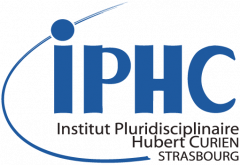Speakers: Louis Lalanne (IPHC)
The atomic nucleus is a quantum many-body system composed of protons and neutrons, bound together by the nucleon nucleon interaction. Understanding how nuclear structure emerges from this interaction and how this structure evolves going far from the valley of stability has become one of the main quests of contemporary nuclear physic. In this seminar, several cases of nuclear structure evolution in exotic isotopes, revealed by different experimental methods will be presented and interpreted. First the study of neutron deficient Ca isotopes using transfer reactions will be discussed, then preliminary results from laser spectroscopy experimental campaigns will be presented.
The 36Ca nucleus has several fascinating properties bringing together multiple fields of nuclear physics. In the mirror pair 36Ca-36S, the Coulomb interaction induces large isospin symmetry breaking effects that act as a magnifying glass of the structure of the excited states. The study of the corresponding mirror energy differences then allows to probe their structures and shapes. Furthermore, with 16 neutrons and 20 protons, 36Ca is expected to show features of a doubly magic nuclei. The magicity of the N=16 sub-shell closure has already been highlighted far from stability, in the neutron rich 24O but have still not been evidenced in the proton rich region. Finally, the 35K(p,γ)36Ca reaction has been identified as one of the ten (p,γ) reactions having the largest impact on the luminosity profile emitted during Type Ia X-ray burst. In this seminar, experimental results obtained at GANIL using (p,d) and (p,t) transfer reactions on 35Ca and 36Ca will be presented, together with their implication in the study of isospin symmetry breaking, shell evolution and nuclear astrophysics.
The Collinear Resonance Ionization Spectroscopy (CRIS) experiment is a laser spectroscopy setup operating at the ISOLDE facility of CERN, allowing to study the evolution of fundamental properties of the ground state (spin, electromagnetic moments and charge radii) as function of the neutron number. In the past few years, the CRIS collaboration undertaken several experimental campaigns aiming at the study of nuclear structure evolution along the Al and and Cr isotopic chains, together with the first experimental study of the RaF and AcF radioactive molecule. The neutron-rich Al isotopes provide an excellent opportunity to investigate the evolution of nuclear structure crossing the N = 20 shell closure and the transition into the N=20 island of inversion (IoI). The neutron rich Cr isotopes, located between the magical Ca and Ni, display the highest level of deformation and collectivity of the region. 64Cr is understood to be at the center of the N=40 island of inversion and the study of Cr ground state property from the stability to the N=40 IoI allows to get a comprehensive picture of the evolution from spherical and single particle behavior to deformed and collective structures. During this presentation, the preliminary results of these experiments will be presented together with the prospects of the CRIS experiment for 2024.
https://indico.in2p3.fr/event/32408/
Début : 24/05/2024 à 15:00
Fin : 24/05/2024 à 17:00
Prochains évènements
Retour à l'agendaSeminaire DRS: DAMIC-M / skipper CCD
Speakers: Xavier Bertou (IJCLab) https://indico.in2p3.fr/event/38024/
Belle II International Masterclasses 2026 (Strasbourg, France)
Quizz : https://belle2.ijs.si/masterclass/quiz.php Vidéos pédagogiques : L'expérience Belle II (8', en Anglais) : http://www1.phys.vt.edu/~piilonen/movies/KEK_eng_short_1029.mp4 One day with a particle physicist (30', en Anglais) : https://www.youtube.com/watch?v=e0Lv2GrsXig&feature=youtu.be Tour of the Belle II experiment (10', en Anglais) : https://istnazfisnucl-my.sharepoint.com/:v:/g/personal/forti_infn_it/EdXqH1QSVjdLnBD8pIiAJL0BPc3eD4dpxuyi8XhgxLbb2Q Display de collisions de Belle II : https://evdisp.belle2.org/ Quelques photos des Masterclasses Belle II 2023 : https://seafile.unistra.fr/d/42b467a0dbae4d40b193/ https://seafile.unistra.fr/d/42b467a0dbae4d40b193/ https://indico.in2p3.fr/event/37591/
